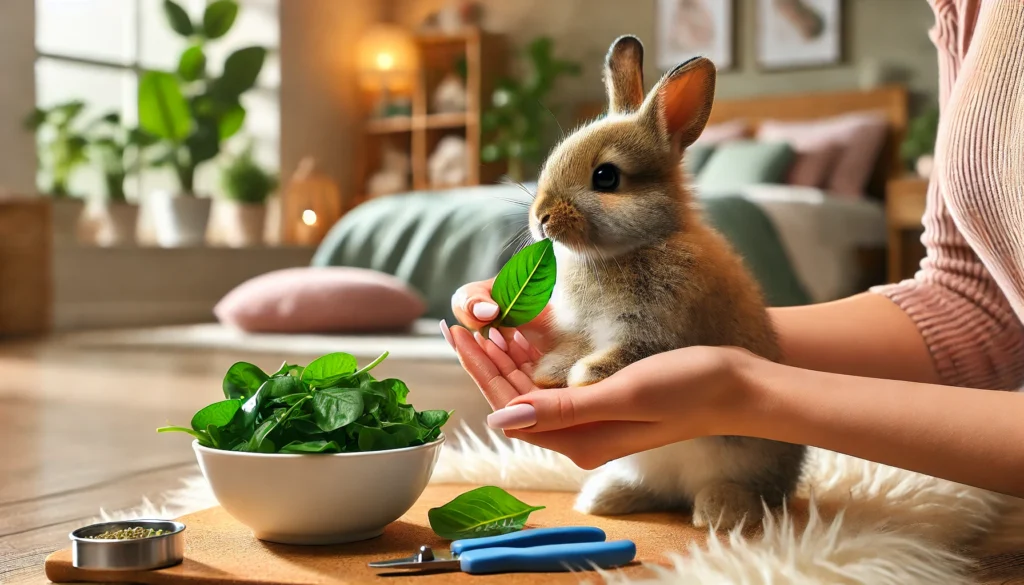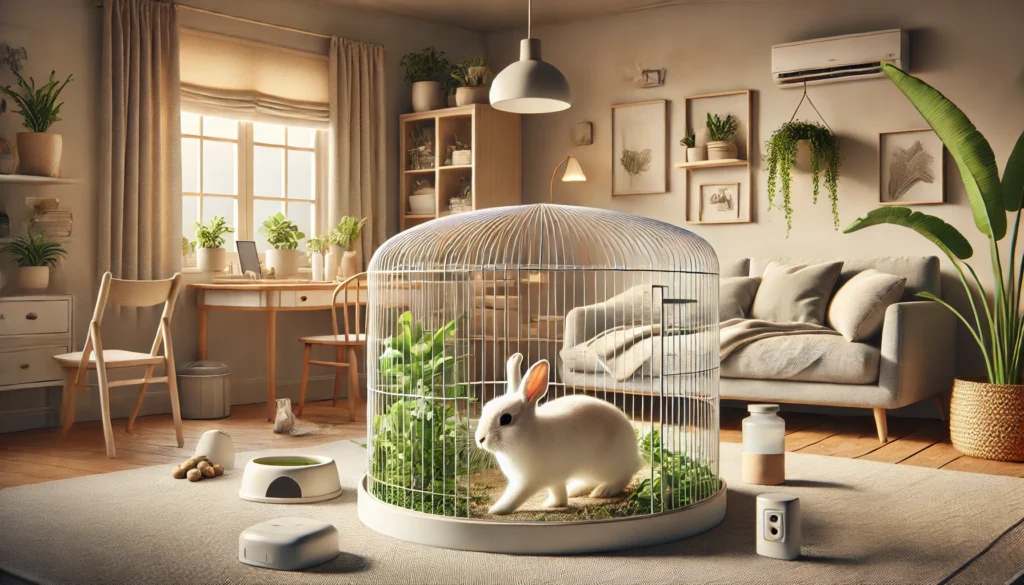Introduction
Rabbits are intelligent, social, and affectionate pets that can live a long and healthy life with proper care. Whether you’re a new rabbit care owner or looking to improve your pet’s well-being, this guide covers everything you need to know!
1. Why Rabbits Make Great Pets
✔ Rabbits can be trained to use a litter box
✔ They are friendly and loving companions
✔ With proper care, they can live for 8-12 years, sometimes even longer
2. Rabbit Breeds and Their Care Needs
| Rabbit Breed | Care Needs | Average Size |
|---|---|---|
| Netherland Dwarf | Minimal grooming, small space | 2-3 lbs |
| Holland Lop | Moderate grooming | 3-4 lbs |
| Lionhead | Requires frequent brushing | 3-4 lbs |
| Flemish Giant | Needs large space, lots of hay | 14-15 lbs |
3. Setting Up the Perfect Home for Your Rabbit
Choosing the Right Cage or Hutch
A rabbit’s living space should be at least 4 times the size of the rabbit. Here’s a size guide:
| Rabbit Weight | Minimum Cage Dimensions |
|---|---|
| Under 3 lbs | 24″ x 24″ x 18″ |
| 3-7 lbs | 30″ x 30″ x 24″ |
| Over 7 lbs | 36″ x 36″ x 30″ |
Providing a Safe Exercise Area
Rabbits need at least 3-4 hours of free movement daily. A playpen or rabbit-proofed room is ideal.
Best Bedding Options
✅ Good choices: Timothy hay, paper-based bedding
❌ Avoid: Pine shavings, cedar chips (harmful to rabbits)
4. Feeding Your Rabbit: Diet & Nutrition
The Importance of Hay
Hay should make up 80-90% of your rabbit’s diet for proper digestion and dental health.
| Type of Hay | Benefits |
|---|---|
| Timothy Hay | High fiber, ideal for adult rabbits |
| Meadow Hay | Varied texture, keeps rabbits interested |
| Orchard Grass | Soft and fragrant, good for sensitive rabbits |
| Oat Hay | Nutrient-rich, great for younger rabbits |
Fresh Vegetables & Greens
Rabbits should eat 1 cup of fresh veggies per 6 lbs of body weight daily.
✅ Good choices: Romaine lettuce, kale, cilantro, parsley
❌ Avoid: Iceberg lettuce, onions, potatoes
Pellets & Treats
✔ Choose high-quality pellets without added sugars
✔ Treats should be given in moderation
Water & Hydration
Always provide fresh water in a bowl or a sipper bottle.

5. Grooming & Hygiene
Brushing & Shedding
✔ Short-haired rabbits: Brush once a week
✔ Long-haired rabbits: Brush daily to prevent matting
Nail Trimming
Trim your rabbit’s nails every 4-6 weeks to prevent overgrowth.
Cleaning Your Rabbit
❌ Do NOT bathe your rabbit – it causes stress
✔ Use a damp cloth to clean dirty spots
6. Health & Common Medical Issues
Signs of a Healthy Rabbit
✔ Active and alert
✔ Eating and drinking normally
✔ Smooth, clean fur
Common Health Problems
| Health Issue | Symptoms |
|---|---|
| GI Stasis | Loss of appetite, bloating, lethargy |
| Dental Issues | Overgrown teeth, difficulty eating |
| Ear Infections | Head tilting, scratching ears |
Regular Vet Check-ups
✔ Annual vet visits for overall health
✔ Spaying/neutering is recommended for better health and behavior
7. Socializing & Bonding with Your Rabbit
Building Trust with Your Bunny
✔ Spend time petting and talking softly to your rabbit
✔ Let them come to you instead of forcing interaction
Introducing Multiple Rabbits Care
✔ Slow introductions are key, as rabbits are territorial
✔ Look for positive signs like grooming each other
8. Understanding Rabbit Behavior
Common Rabbit Care Behaviors & What They Mean
| Behavior | Meaning |
|---|---|
| Thumping | Warning signal or fear |
| Binkying | Happiness and excitement |
| Teeth Grinding | Soft grinding = content, loud grinding = pain |
Training Your Rabbit
✔ Litter training is easy with positive reinforcement
✔ Rabbits can learn simple tricks using treats

9. Creating a Safe Environment for Your Bunny
Rabbit-Proofing Your Home
✅ Secure electrical cords to prevent chewing
✅ Remove toxic plants (lilies, ivy)
✅ Block off small spaces where rabbits might get stuck
10. Seasonal Rabbit Care
Summer Rabbit Care
✔ Keep rabbits in cool, shaded areas
✔ Provide plenty of fresh water
✔ Avoid direct sunlight exposure
Winter Rabbit Care
✔ If kept outdoors, provide extra bedding and a heat pad
✔ Keep enclosures draft-free
Conclusion
Caring for a rabbit care requires dedication, love, and attention. By following these guidelines, you can ensure your rabbit stays healthy, happy, and well cared for. Every rabbit is unique, so understanding their needs will create a fulfilling bond between you and your furry friend!
Frequently Asked Questions (FAQs)
Q1: How often should I clean my rabbit’s cage?
A: Spot-clean daily and deep-clean the cage once a week.
Q2: Can I feed my rabbit fruits and vegetables daily?
A: Yes, but fruits should be given in moderation due to sugar content.
Q3: How do I know if my rabbit is sick?
A: Signs include lethargy, appetite loss, irregular droppings, or difficulty breathing. Consult a vet immediately.
Q4: Should I spay/neuter my rabbit?
A: Yes! It helps prevent health issues and improves behavior.
More Info: https://alsawfa.com/wp-admin/post.php?post=3688&action=edit
